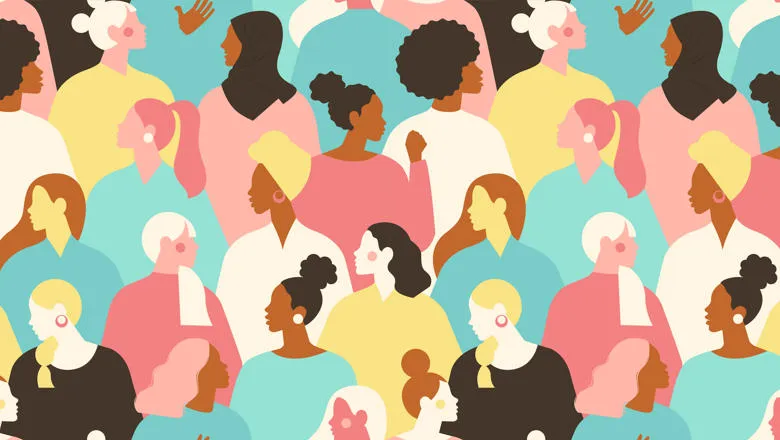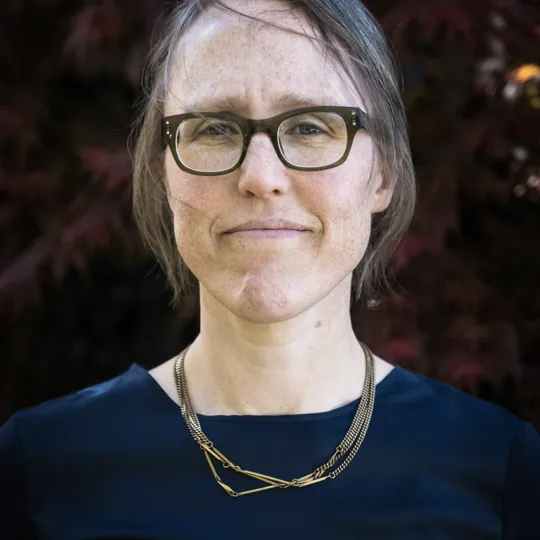Entrepreneurs everywhere are being affected by COVID-19; for most demand for their services and products has collapsed and others scramble to buy necessary supplies and materials. But in low to middle income countries with less of a government safety net and less government support such as emergency loans and grants to businesses, the struggles of women-led businesses have particularly severe consequences for their families and for local economies.
Ute Stephan, Professor of Entrepreneurship at King’s Business School
07 March 2021
International Women's Day 2021: The contribution of the women at King's to the global response to COVID-19
As part of the UN’s International Women’s Day 2021 theme “Women in leadership: Achieving an equal future in a COVID-19 world”, we recognise the important contributions of our community of women academics, students and alumni throughout the pandemic. The theme celebrates the tremendous efforts by women around the world in shaping a more equal future and recovery from the COVID-19 pandemic.

At King’s we are very proud of our women, and their accomplishments. In a year unlike any other, they have shown a tireless dedication to the global response to COVID-19, whether that has been through research to understand the virus delivered at a rapid pace to our doctors and nurses on the front-line saving lives.
Their research undertaken has not only helped us understand the science of the virus, but it has also highlighted the disproportionate social and economical impact the coronavirus continues to have of on women. Understanding this will help shape an equal future for women beyond the pandemic which is something King’s is committed to creating and work is continuing across the university to achieve a world where no-one is at a disadvantage because of their gender.
Below are examples of just some of the exceptional work women from across all our faculties have undertaken in response to the pandemic.
Supporting women entrepreneurs around the world impacted by the pandemic
Ute Stephan, Professor of Entrepreneurship at King’s Business School, joined the Cherie Blair Foundation for Women's new programme providing free, online business resilience training to women entrepreneurs living in low and middle income countries worldwide. The Scheme will help women entrepreneurs in low to middle income countries negotiate the impact of COVID-19.
According to research by the Foundation:
- 93% of women entrepreneurs in low to middle income countries have already been negatively impacted by COVID-19.
- Nearly half (44%) of those impacted have ceased operations temporarily
- 3% have ceased operations permanently.
One in five people have COVID-19 without symptoms
Dr Claire Steves, consultant geriatrician in the Faculty of Life Sciences and Medicine led an antibody testing study which found that one in five people in London and the South East who have been infected with coronavirus didn’t show any symptoms of COVID-19 and that more than a quarter who did fall ill didn’t have the three core signs of the disease: persistent cough, fever and loss of smell (anosmia).
Dr Claire Steves said, “Our findings highlight the fact that a significant proportion of people who get infected with coronavirus don’t have any obvious symptoms but may still pass the disease on to others. It’s essential that we all take steps to protect the health of everyone by sticking to social distancing guidelines, wearing face coverings in public and following good hand hygiene practices".
In December 2016, Rianna Walcott GTA in Digital Humanities, PhD candidate in the Faculty of Arts and Humanities and Toby Sharpe were awarded an Innovation Initiative Grant by the University of Edinburgh Development Trust to create ‘Project Myopia’, connecting globally disparate people with concerns about education reform.
Now funded by the London Arts and Humanities Partnership (LAHP), this website is devoted to diversifying university curricula through crowdsourcing material from students, revolutionising the way that curricula are designed.
Britons among least likely to prioritise gender pay gap in Covid recovery
A new global study to mark International Women’s Day 2021 by the Global Institute for Women’s Leadership has found that Britons are among those least likely to prioritise tackling the gender pay gap right now as society rebuilds from the Covid-19 pandemic.
Despite previous research showing women have been worse hit economically by the crisis, 28% of the British public say closing the gender pay gap is important and should be one of our top priorities right now – much lower than similar western European nations.
It's been said that were at a coronavirus crossroads: we face a choice between building back better or allowing progress on gender equality to stall or even be reversed. As the world decides which path to take, the good news is that the vast majority of people recognise that closing the gender pay gap is important. The bad news is that in many countries, people are less clear it should be a top priority right now, as we begin to reopen and rebuild society. But if we’re to have any chance of ensuring women don’t lose out further because of the crisis, we need to keep this issue high on the agenda.
Julia Gillard, former Prime Minister of Australia and Chair of the Global Institute for Women’s Leadership at King’s College London
Mental health difficulties have been widespread as a result of the COVID-19 pandemic. However, evidence has shown that minority ethnic groups are disproportionately vulnerable to both the disease itself, and the socio-economic impacts.
Dr Valentina Cardi, from the Department of Psychological Medicine at the Institute of Psychiatry, Psychology & Neuroscience (IoPPN) at King’s, was awarded £235,000 in funding from UK Research and Innovation (UKRI) to investigate the mental health difficulties experienced by young, Black adults during the COVID-19 pandemic.
Her research aims to better understand the reasons for increased vulnerability to COVID-19, and the socio-economic impacts on minority ethnic groups.
Analysis: Women in favelas step up during inadequate COVID-19 government response
Favela communities in Brazil have been severely affected by the COVID-19 pandemic. Not a day goes by without news of increasing deaths and severe political mishandling by President Jair Bolsonaro – intensifying existing inequalities and worsening conditions amongst the extremely marginalised people of Rio de Janeiro. Professor Cathy McIlwaine, Professor of Development Geography and Vice Dean (Research), Faculty of Social Sciences and Public Policy explored how the women of the city’s ‘slums’ are picking up the slack in an effort to support and protect their communities and what life is like in Brazil’s largest favela in Rio De Janeiro.
One in five people in south London live with multiple long-term conditions
Research led by Alessandra Bisquera, from the School of Population Health & Environmental Sciences in the Faculty of Life Sciences and Medicine found one in five people in the south London live with multi-morbidity.
The research showed multi-morbidity is more common among women and Black ethnic minority groups. An estimated 21% of the population had multi-morbidity and the number of conditions increased progressively with age, with people aged 80 and above having a median of four conditions.
The study also identified clusters of conditions that commonly occur concurrently. The first cluster, affecting adults between 18-39, showed anxiety and depression to occur simultaneously. The second cluster associated with age and polypharmacy identified heart conditions and dementia. The third cluster identified cardiometabolic diseases and chronic pain among older ages and Black ethnic groups. The final cluster identified at-risk behaviours such as alcohol and substance dependency in young males who also smoke.
The research highlights the need for healthcare providers to tailor care for multiple long-term conditions. This need has been highlighted by the COVID-19 pandemic, as people with prior diseases such as hypertension, diabetes, or coronary heart disease are more likely to get severe symptoms or die from COVID
Connecting families with their loved ones through the pandemic
Life Lines, developed by Professor Louise Rose, Professor of Critical Care Nursing, Florence Nightingale Faculty of Nursing, Midwifery & Palliative Care and Dr Joel Meyer, a critical care consultant at Guy’s and St Thomas’s enables virtual hospital visits from families throughout the pandemic by delivering 4G-enabled tablets to intensive care units. What started as an idea is now a UK-wide initiative and the project has distributed more than 1,100 devices to 174 NHS organisations, spanning from Cornwall to the Orkney Islands.
Since its launch, the project has been scaled up rapidly to support hundreds of families who are unable to visit loved ones in intensive care units due to restrictions put in place through this pandemic.
A total of 27,000 calls have been made through Life Lines devices, accumulating a call time of nearly 200,000 minutes. In addition to allowing patients to speak to their relatives, these calls, or virtual visits, also give families the opportunity to meet the clinical team providing care, ask questions and better understand the environment their loved one is being treated in.
Professor Caitjan Gainty, Lecturer in the History of Science, Technology and Medicine in the Faculty of Arts and Humanities co-authored an article for The Conversation which explored vaccine hesitancy and how approach the encouraging the uptake of the COVID-19 vaccine.
New study finds prevalent and harmful harassment and discrimination within NHS healthcare workforce
Research by Rebecca Rhead, Research Associate, and Stephani Hatch, Professor of Sociology and Epidemiology from the Institute of Psychiatry, Psychology & Neuroscience (IoPPN) found prevalent and harmful harassment and discrimination committed by and against NHS staff working in London Trusts. Furthermore, women, Black ethnic groups and migrant NHS staff were more likely to experience harassment and discrimination.
This study specifically looked at mistreatment of staff by their colleagues, excluding the more commonly reported cases involving patients or their families. Researchers found that 20% of the sample reported experiencing discrimination and 41% reported experiencing bullying, harassment or abuse. The study showed that experiencing workplace discrimination and harassment was associated with poor mental health and physical health, long term sickness absence and low job satisfaction. Moreover, that witnessing such discrimination and harassment can also negatively impact staff’s experience.
A new partnership to foster female-driven innovation and entrepreneurship
The King's Entrepreneurship Institute announced a partnership between their flagship programme for women, the Women’s Entrepreneurship Programme, and Home Grown, a private members’ club for high-growth entrepreneurs. Five of the programme’s alumni have been hand-picked for their exclusive membership worth an estimated £10,000. This supportive and inspiring environment is ideal for the budding King’s entrepreneurs to further build their network and continue to thrive in their business expansions. The projects included:
- Grandnanny, a service that connects families looking for reliable after school childcare to older neighbours looking for rewarding local employment
- The Golden Circle, the UK's first professional home-schooling group.
Analysis: Professor Parosha Chandran on modern slavery during the COVID-19 pandemic
Parosha Chandran, Professor of Modern Slavery Law in The Dickson Poon School of Law, was interviewed by The Guardian after a spike in COVID-19 cases in Leicester was blamed on sweatshop conditions in factories.
In the interview, Professor Chandran says the type of exploitation seen in Leicester is happening across the country, and that she’s not surprised a recent survey calculated 100,000 victims of modern slavery in the UK.
Chemist shortlisted as Falling Walls finalist Science Breakthroughs of the Year
Dr Rivka Isaacson, Associate Dean for Doctoral Studies and Reader in Chemical Biology in the Faculty of Natural and Mathematical Science collaborated with the London Fine Arts studio on the 2019 multimedia project Viewing the Invisible, which was shortlisted in the Science in the Arts category. In partnership with Berlin Science Week, the Falling Walls Science Breakthroughs of the Year highlights breakthrough scientific thinking from around the world that are helping to solve some of our biggest challenges.
Viewing the Invisible challenged the popularly held belief that science and art exist at polar ends of a spectrum. The project showcased ways in which both disciplines work together, exploring how scientists and artists can support each other in disseminating research and enriching creativity.
In this story
Related departments
- Faculty of Life Sciences & Medicine
- Faculty of Arts & Humanities
- The Dickson Poon School of Law
- Faculty of Natural, Mathematical & Engineering Sciences
- Faculty of Social Science & Public Policy
- Florence Nightingale Faculty of Nursing, Midwifery & Palliative Care
- King’s Business School
- King’s Entrepreneurship Institute
- King's Global Institute for Women’s Leadership
- Institute of Psychiatry, Psychology & Neuroscience
- Faculty of Dentistry, Oral & Craniofacial Sciences
- ESRC Centre for Society and Mental Health












